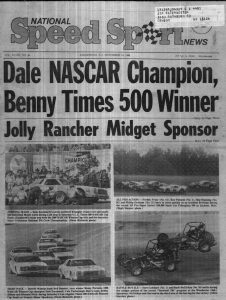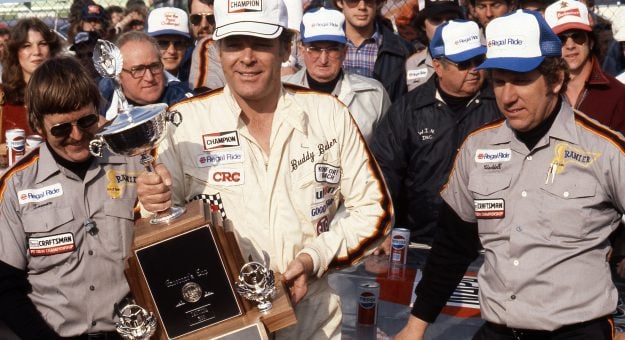Editor’s Note: NASCAR is celebrating its 75th anniversary in 2023. SPEED SPORT was founded in 1934 and was already on its way to becoming America’s Motorsports Authority when NASCAR was formed. As a result, we will bring you Part 33 of a 75-part series on the history of NASCAR as told in the pages of National Speed Sport News and SPEED SPORT Magazine.
“This I could get used to. Fact is, I’d like it to become habit forming,” said Dale Earnhardt after his first superspeedway victory at Atlanta Motor Speedway on March 16. Before the season concluded, Earnhardt added four more victories en route to his first NASCAR Winston Cup championship.
Earnhardt started his second full season of Winston Cup competition with a second-place finish in the Winston Western 500 at Riverside (Calif.) Int’l Raceway behind Darrell Waltrip. He beat Waltrip three weeks later with a third-tum, white-flag lap pass in the second Busch Clash at Daytona Int’l Speedway.
Then, Earnhardt outran Waltrip and all but three other drivers in the Daytona 500 to solidify his point lead.
However, Feb. 17 was Buddy Baker’s day. The 22-year veteran started from the pole and pushed his Oldsmobile to a record average speed of 177.602 mph for a record stock car victor’s purse of $102,275. Baker led 143 of the 200 laps in front of more than 100,000 fans and 13 CBS television cameras.
Earnhardt added a fifth-place finish at Richmond (Va.) Raceway and a third-place run at North Carolina Motor Speedway before his triumph at Atlanta. Despite his relative inexperience at NASCAR’s highest level, the 28-year-old was confident in victory: “Winning doesn’t surprise me, really. We have the team to be competitive and I think this is just the beginning.”
In the same race, Rusty Wallace finished second in his Cup Series debut.
Earnhardt claimed his second consecutive victory at Bristol (Tenn.) Motor Speedway on March 30, besting Waltrip by 8.7 seconds. He took the lead for good after Cale Yarborough dropped a cylinder late in the race.
Earnhardt Appears Unbeatable
Through the first six races, Earnhardt looked almost unbeatable with two victories and top-five finishes in each race.

The streak ended at Darlington (S.C.) Raceway when his Rod Osterlund Oldsmobile blew an engine on the 104th lap. David Pearson won the race for his 105th and final series victory.
Earnhardt did not stay down for long.
He tagged seven top-10s in the next 10 events onto his season total and led Richard Petty by 211 points as the circuit visited Nashville (Tenn.) Fairgrounds Speedway.
It marked the Osterland team’s first race with 21-year-old Doug Richert as crew chief after Jake Elder left the team. Elder told SPEED SPORT in the June 4 edition that he left because of discord with team manager Roland Wlodyka and owner Osterlund.
“Rod tells me one thing and Roland another,” Elder said. “I tell Roland what I need ana he tells me we can’t do that. The top teams bring twice as many people to the track as we do, and I had no authority to get the people I need.”
Nevertheless, when Earnhardt won at Nashville, he credited his young crew chief’s decision to practice during the hot Saturday afternoon before the race with the victory:
“By the long practice sessions we got an idea of what the heat, especially the tire heat, was going to be like and it helped us. This was one of the best races I ever won.”
Tension Escalates For Waltrip
Meanwhile, Waltrip held four victories on the track with the DiGard team, but changes were on the way.
DiGard crew chief Buddy Parrott was fired after the June 15 race at Michigan lnt’l Speedway and replaced by Elder. Then, Waltrip’s desire to void the final three years of his contract with DiGard and move, reportedly, to the Junior Johnson team surfaced.
“I don’t guess I ever will be satisfied driving for someone else,” said Waltrip in the Aug. 8 issue of NSSN. “We are not having a good year and I just want to get it over with so I can start next year.”
The tension escalated beyond Waltrip’s mere dissatisfaction when DiGard CEO Bill Gardner refused to release the Franklin, Tenn., native from his contract.
“We will do whatever it takes to enforce our rights under the contract,” said Gardner in the Oct. 8 issue of NSSN. “He has notified me be will rot drive for us next season. I consider that a breach of contract and I am willing to go to court over it.”
“I guess we’ll have to go to court about it,” concluded Waltrip in the Sept. 24 edition.
The two sides never went to court as Waltrip bought the final three years of his contract from DiGard. He moved into the Junior Johnson No. 11 Chevrolet for 1981, replacing three-time Cup Series champion Cale Yarborough. Leaving the Yarborough/Johnson partnership which produced 55 victories from 1973 to 1980 seemed a puzzling move, but Yarborough also cited other reasons.
“I have neglected my wife and our three daughters for the last eight years. I’m gone 90 percent of the time,” he said announcing he would race a limited Winston Cup schedule beginning in 1981. “David Pearson wouldn’t be around today if he had kept running all the races. He shows up fresh and comes at you like gangbusters. Just because I’m cutting back doesn’t mean I don’t plan to keep winning.”
Yarborough compiled a Winston Cup-high six victories and a record 14 poles in 1980. He also led 28 of the 31 races he started for 2,810 laps and, with five races remaining, trailed Earnhardt by 90 points in the championship race.
Earnhardt lengthened his lead to 105 points with his fourth victory of the season at Martinsville Speedway and pushed the margin to 115 after another trophy at Charlotte Motor Speedway. But Yarborough followed Earnhardt’s double with his own, winning at Atlanta and North Carolina Motor Speedway to trim the points margin to 29 markers.
Is The Pressure Getting To Dale?
“Maybe the pressure is getting to Dale,” Yarborough jabbed after he outdueled Earnhardt in the final laps for the Atlanta victory.
With only the L.A. Times 500 at Ontario (Calif.) Motor Speedway remaining, the pressure was on both men and they responded.
Earnhardt started outside the front row next to Yarborough, but fell one lap down early in the race when he left the pits with only two lug nuts on his right rear wheel. He overcame this early gaffe and finished fifth.
Yarborough, meanwhile, drove in the top three throughout the day and led eight times before finishing third behind Benny Parsons and Neil Bonnett. However, be still trailed Earnhardt by 19 points. Earnhardt became the only driver to win rookie of the year and the championship in consecutive seasons.
Jody Ridley edged Lake Speed and Kyle Petty for rookie honors in 1980.
Other titlists included Dean Combs in International sedans (formerly baby grand) division and Ray Smith in Winston West. Beaver Dragon won the Molson Tour (formerly NASCAR North) for the second consecutive season. In the modified division, Richie Evans won his third straight title on the strength of 37 victories in 65 starts.
Morgan Shepherd was the late model sportsman champion.
